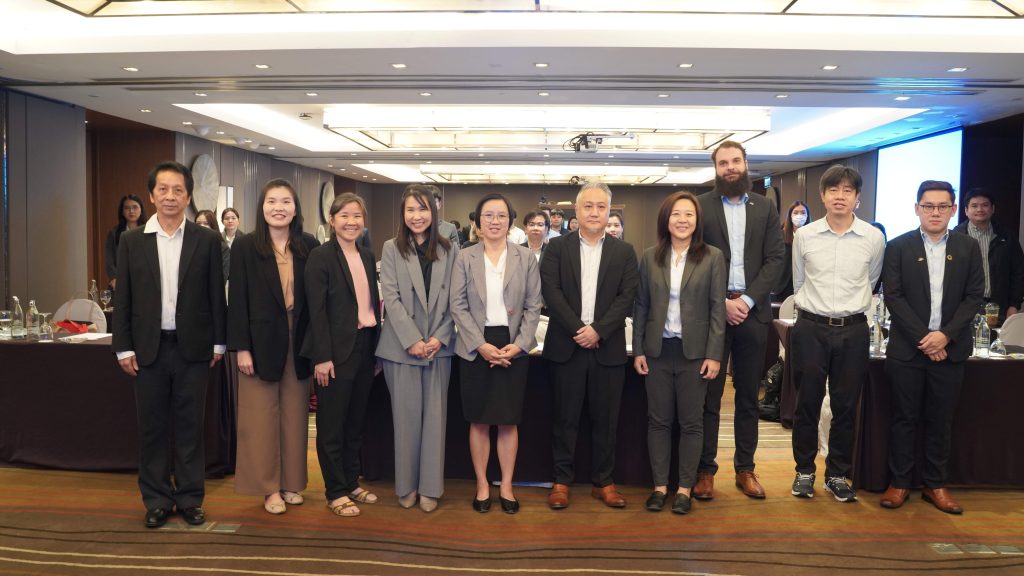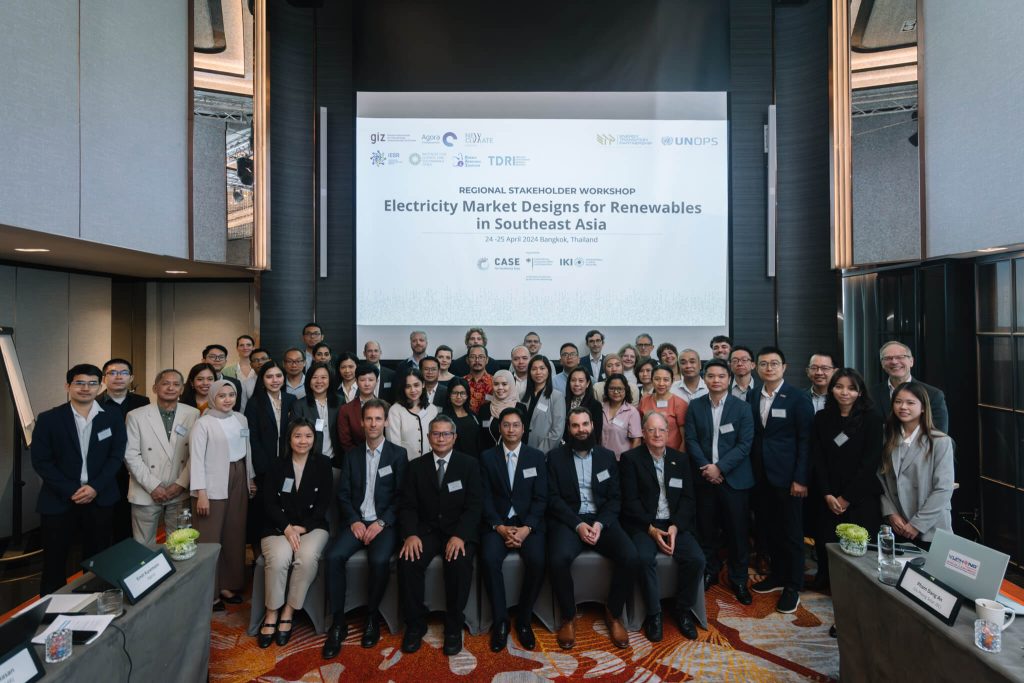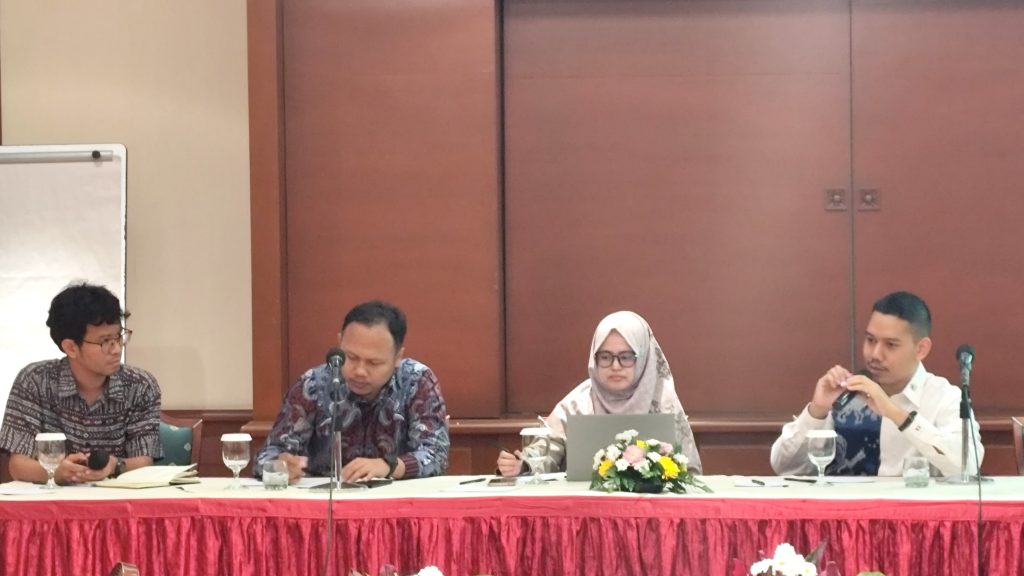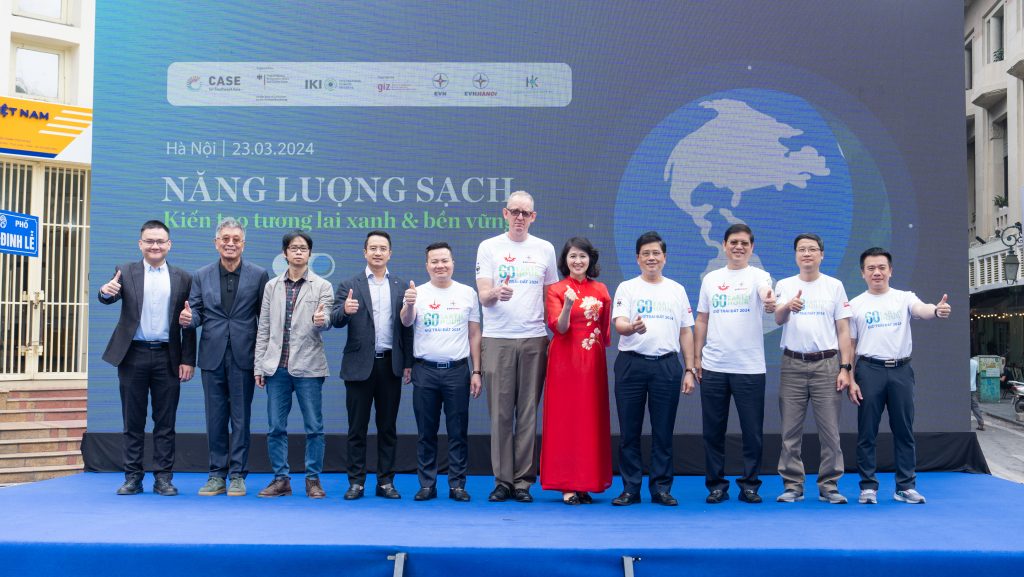Bangkok, 18 June 2024 – The Deutsche Gesellschaft für Internationale Zusammenarbeit (GIZ) GmbH, the Energy Research Institute of Chulalongkorn University (ERI), and Agora Energiewende, implementing partners under the project Clean, Affordable, and Secure Energy for Southeast Asia (CASE), co-hosted a public seminar titled “GasLens: roles of gas towards carbon neutrality in Thailand” alongside the Energy Policy and Planning Office (EPPO), CASE’s political partner, at the Centara Grand Ladprao Hotel.
Sasithon Jedsadathitikul, Director of Strategy and Planning Division, Energy Policy and Planning Office, opened the event by stating that climate change is clearly impacting everyone through hotter weather, droughts, and rainfall patterns deviating from seasonal norms. Thailand is aware of these impacts, prompting the announcement of the country’s Carbon Neutrality target for 2050 and the pursuit of Net Zero greenhouse gas emissions by 2065 at COP26. EPPO itself has developed the National Energy Plan, recognizing that the energy sector is the highest carbon emitter. Therefore, in addition to focusing on energy security and competitiveness, sustainability and environmental concerns are priorities to achieve carbon neutrality goals.
Ms. Sasithon noted that the Power Development Plan (PDP) 2024, currently open for public comments, indicates a reduction in fossil fuels like coal and natural gas while increasing the share of renewable and clean energy sources. The direction of energy policy aligns with environmental objectives. Over the next 10-15 years, Thailand will undergo an energy transition phase before moving towards energy liberalization, including becoming an LNG trading hub.
A new study, “Roles of Gas Towards Carbon Neutrality: Thailand Insights,” explores Thailand’s natural gas sector, carbon neutrality drivers, and challenges for gas in a low-carbon future. Through industry expert interviews, the research examines trends in gas use, enabling mechanisms for transition, and the impact of renewables, electrification, hydrogen, and carbon capture technologies. It also explores the risks, impacts, and opportunities arising from the energy transition.
Dr. Siripha Junlakarn, representative from CASE and Dr. Supawan Saelim, Agora Energiewende, presented research findings indicating that reducing the share of natural gas in Thailand’s power generation is crucial for the country to achieve carbon neutrality goals. In 2022, natural gas usage emitted around 74 million tonnes of carbon dioxide (CO2), with approximately 68% coming from power production.
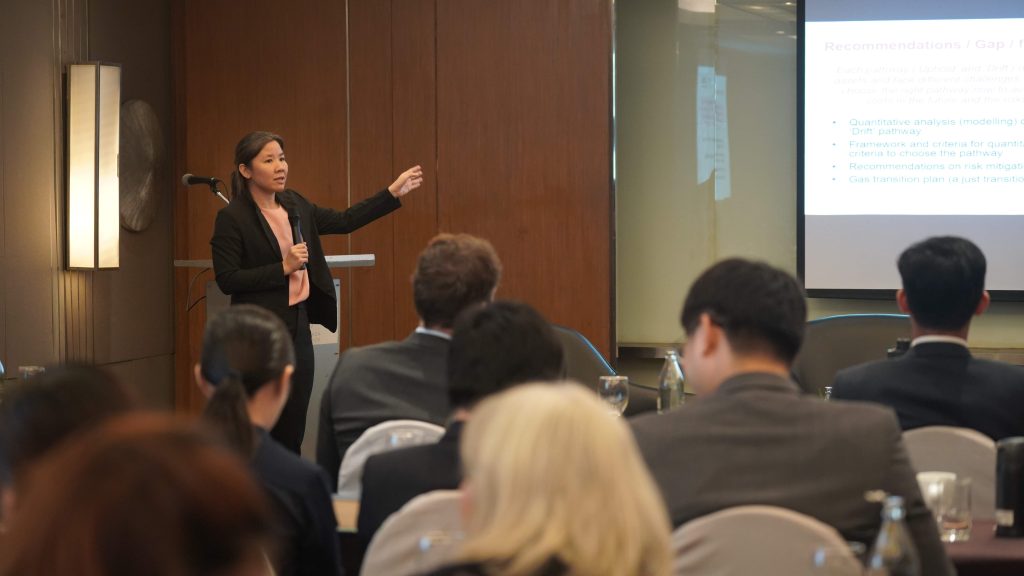

Additionally, increasing the share of clean electricity or reducing natural gas usage in power generation would also enhance carbon reduction efforts in the transportation and industrial sectors as they shift towards electrification, such as through the adoption of electric vehicles (EVs). The results from multiple energy scenario models revealed that for Thailand to attain carbon neutrality, the proportion of natural gas used for power generation must decrease to less than 20% by 2050.
The researchers highlighted three critical factors affecting Thailand’s carbon neutrality pathway, as follows:
- Thailand’s increasing need to rely on importing more liquefied natural gas (LNG) for power generation due to dwindling domestic natural gas resources. This leads to greater risks in ensuring reliable and affordable natural gas supply that is vulnerable to global factors. Having risk mitigation plans, such as studying the feasibility of new natural gas discoveries and diversified LNG import portfolios, therefore plays a crucial role in strategic planning to reduce the impacts of these risks.
- Building more facilities for natural gas and LNG imports might trap Thailand into using them for a long time (carbon lock-in). This makes it expensive to switch to cleaner and potentially cheaper energy sources later. There’s also a risk that these facilities become useless (stranded assets) if Thailand decides to use less natural gas in the future. On top of that, technologies to capture and store carbon from natural gas (CCS/CCUS) are uncertain and could make reaching climate goals more expensive if Thailand relies heavily on natural gas.
- Natural gas plays a vital role in ensuring grid reliability by providing flexible generation to support increased renewable power integration. Gas-fired power plants can ramp up during peak demand periods when solar and wind generation is insufficient. However, regulatory reforms, new market mechanisms, and additional investment are needed to increase the flexibility of the gas supply chain and provide financial incentives.
“Global trends towards sustainability and achieving net-zero greenhouse gas emissions impact Thailand’s economic competitiveness, as Thailand relies on exports and services from abroad for more than 50% of its gross domestic product (GDP). Therefore, if Thailand cannot meet the increasing demand for clean energy from businesses, it may impact the competitiveness of Thai businesses and lead to relocation of manufacturing bases to other countries.” The research team stated
Proactive energy planning is essential to achieve our carbon neutrality target.
The researchers highlighted opportunities for Thailand to improve its energy planning through a more proactive approach, allowing for better alignment with global technology and price trends. Updating current energy development plans with the latest data and assumptions will ensure that they reflect current realities. Clearly defining policy issues before incorporating them into plan development will further strengthen the planning process. By keeping abreast of changing circumstances, Thailand can improve its planning assumptions. Revising the carbon reduction plans provides an opportunity to update the energy plans accordingly. Extending Thailand’s current Power Development Plan (PDP) beyond 2037 will support the achievement of the 2050 carbon neutrality target and address potential risks and challenges.
The research team stated that there is an opportunity to enhance the flexibility and agility of Thailand’s energy planning to better keep pace with global technology and price trends. The current energy development planning process relies on past data and assumptions that may not fully reflect present situations, and it has to go through an approval process by working committees. Moreover, if plans related to carbon emission reduction need to be adjusted, the energy plan would also need to be revised accordingly. Currently, Thailand has a Power Development Plan (PDP) as a guideline until 2037, but there is a tendency that this plan may pose risks and challenges in allowing Thailand to achieve carbon neutrality by 2050.
Moreover, the draft PDP 2024, which continues to rely heavily on gas, would require carbon capture and storage (CCS) technology to achieve carbon neutrality. However, CCS currently comes at a high cost. To make CCS viable, the government would need to implement carbon pricing mechanisms or provide subsidies to support the development of such projects. As for the use of new energy sources like hydrogen in the power generation sector, it may not be an efficient option in terms of technical impact and cost in the short and medium term. Instead, its application should be considered in other sectors where there are fewer alternatives for carbon reduction and where investment would be more cost-effective.
Find new market for LNG as Thailand aims to reduce new natural gas usage
Dr. Ruengsak Thitiratsakul, Advisor to the Petroleum Institute of Thailand, stated that Thailand has great potential to become a Regional LNG Hub. The current infrastructure can accommodate 19 million tons of LNG imports per year, and there are plans to expand this capacity to 30 million tons per year by 2028. In the long run, if LNG demand decreases, he views that the existing LNG infrastructure can be adjusted gradually. Thailand does not have to completely stop using natural gas or LNG immediately. There are still several options, such as Thailand becoming a hub for exporting LNG to smaller markets like the CLMV countries (Cambodia, Laos, Myanmar, and Vietnam).
“In ASEAN countries, each nation has different timelines for achieving carbon neutrality, so their natural gas demand will persist for at least 20 more years. As for the possibility of adapting the LNG infrastructure for future hydrogen energy, it seems feasible, such as importing LNG to produce hydrogen through methane pyrolysis. However, another concept is to utilize wet LNG, which would depend on the viability of procuring wet LNG through equity investments in overseas production sources,”
Dr. Ruengsak Thitiratsakul, Advisor to the Petroleum Institute of Thailand

Regarding the development of the hydrogen business in Thailand, Dr. Pramote Puengjinda, Senior Project Advisor for the International Hydrogen Ramp-up Programme from GIZ Thailand stated,

“Thailand needs to follow a strategic approach based on the projected demand level. If initial hydrogen demand is low, Thailand may need to integrate hydrogen usage across multiple sectors along with other technologies to increase consumption to a viable level for establishing a hydrogen business. However, if there is high hydrogen demand from the beginning, Thailand must simultaneously work on three main areas: identifying and securing hydrogen production sources, preparing hydrogen infrastructure readiness, especially transportation and logistics systems, and developing a national roadmap for Thailand’s hydrogen technology development.”
About Clean, Affordable, and Secure Energy for Southeast Asia (CASE)
The Project “Clean, Affordable and Secure Energy for Southeast Asia” (CASE) is jointly implemented by the Deutsche Gesellschaft für Internationale Zusammenarbeit (GIZ) GmbH and international and local expert organizations in the area of sustainable energy transformation and climate change. At regional level, these are Agora Energiewende and NewClimate Institute.
Funded by the German Federal Ministry for Economic Affairs and Climate Action (BMWK), CASE aims to support a narrative change in the region’s power sector towards an evidence-based energy transition, in the pursuit of the Paris Agreement goals. The project makes use of available research initiatives while generating new evidence grounded in local realities that can influence economic managers, power sector decision makers, industry leaders and electricity consumers to support early, speedy, and responsive strategic reforms in the power sector. To reach this objective, the project applies a joint fact-finding approach involving expert analysis and dialogue to work towards consensus by converging areas of disagreement. Read more: caseforsea.org

